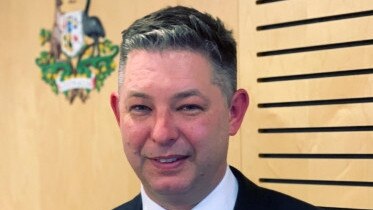Sexy dolls Fair Work boss Gerard Boyce faces bias case
Gerard Boyce, who attracted controversy for displaying ‘scantily clad’ figurines in his chambers, has had two decisions quashed.

A Coalition-appointed Fair Work deputy president, who attracted controversy for setting off firecrackers at a staff gathering and displaying “scantily clad” figurines in his chambers, has had two decisions quashed following a judgment by a tribunal full bench.
Gerard Boyce was criticised by the full bench after refusing an application by Regional Express for him to recuse himself from dealing with a stop-bullying action by an airline engineer, Stephen Hanson.
The airline acted after discovering that following Mr Boyce reserving his decision on the stop-bullying application, his associate privately telephoned Mr Hanson’s lawyer seeking information about the engineer’s employment status without informing the airline’s lawyers.
The airline said the communication gave rise to a reasonable apprehension of bias and sought to have Mr Boyce recuse himself.
Mr Boyce refused and the airline appealed.
On the day before the full bench appeal was heard in April, Mr Boyce handed down his decision on the stop-bullying application, finding airline managers bullied Mr Hanson and compromised his health and safety through unreasonable behaviour.
Ruling on the company’s appeal of both decisions, the full bench said undisclosed ex parte communications between a member of a court or a tribunal and a party about matters of substance in contested litigation were a serious matter.
The full bench cited a High Court judgment by then chief justice Harry Gibbs, who found it was a “fundamental principle that a judge must not hear evidence or receive representations from one side behind the back of the other”.
It said Mr Boyce breached this principle by initiating, through his associate, an ex parte telephone call with Mr Hanson’s lawyer about “matters of substantive significance in the proceedings”.
He did not take any step to disclose the communication to the airline prior to Mr Hanson’s lawyer revealing it to the company.
The full bench said Mr Boyce’s communication, through his associate, with Mr Hanson’s lawyer, and the way he dealt with the company’s recusal application gave rise to a reasonable apprehension of bias, disqualifying him from further dealing with the stop-bullying application.
It found Mr Boyce, in his decision dismissing the recusal application, engaged in direct personal criticism of counsel for the airline.
It said Mr Boyce’s criticism that the airline’s counsel “spoke on various occasions “in a high-pitched voice and patronising tone” barely dignifies comment except to say that it was “entirely unjustified and inappropriate”.
“The observance of procedural fairness is an implied condition of the exercise of the commission’s jurisdiction so that any breach of the rules of procedural fairness, including where apprehended bias is demonstrated, constitutes jurisdictional error,” the full bench said.
“The deputy president thus fell into jurisdictional error by failing to recognise that he was disqualified from continuing to deal with Mr Hanson’s stop-bullying application by reason of a reasonable apprehension of bias.”
It quashed Mr Boyce’s recusal decision and the liability decision against the airline, with the bullying application, lodged more than two years ago, to be heard by another member of the commission.
The Australian revealed in March that Mr Boyce had been referred to NSW police after letting off two “throwdown” firecrackers during a post-Christmas party staff gathering on the tribunal’s office balcony in Sydney.
Under NSW law, it is illegal to buy, possess or discharge fireworks unless a person has a single-use licence or holds a pyrotechnician’s licence.





To join the conversation, please log in. Don't have an account? Register
Join the conversation, you are commenting as Logout